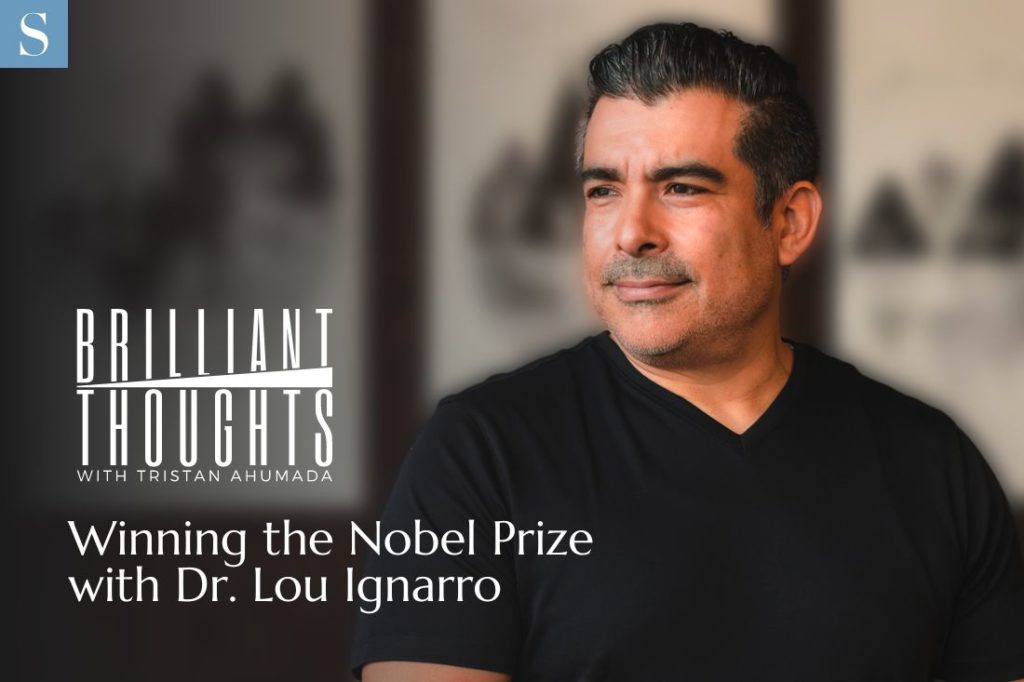If your 13-year-old’s favorite pastime is building bombs and fireworks, you might be a little (or a lot) concerned. You may start to worry about budding behavioral issues or the state of their mental health. Just remember this: Your child’s bizarre interests may indicate a highly creative, scientific mind rather than an issue that needs fixing.
“I made my first firecracker, which was successful, and then I graduated from there and made a larger, more powerful firecracker,” explains Nobel Prize winner Dr. Lou Ignarro lightheartedly in his recent conversation with Brilliant Thoughts’ host Tristan Ahumada. “And my passion for that kind of chemistry never waned, never disappeared.”
Now retired, Ignarro recently published a book called Dr. NO: The Discovery That Led to a Nobel Prize and Viagra. It details not only his critical research into nitric oxide and how it led to the development of many pharmaceuticals, including Viagra, but also the critical insights he gleaned along his journey.
Curiosity fuels discovery.
“Even though I have been retired from my basic scientific research for about six or seven years, the curiosity never leaves me,” says Ignarro. “I’m always saying to myself, ‘Oh, darn it, if I had an active laboratory again, this is what I would do,’ and every day I come up with a new idea.”
Throughout his career as a pharmacologist, Ignarro was unyieldingly curious, hungry for understanding. He was forever breaking things down to study their constituent parts and how those parts affected the whole. He says that more than anyone, his father encouraged his young scientific mind by allowing him to experiment with building explosives, despite his mother’s legitimate safety concerns.
“He would always tell me, ‘Son, you know, I want you to grow up to be somebody, I do not want you to be a laborer or a carpenter, like me,’” Ignarro tells Ahumada. “So, you know, my dad just wanted me to excel, so he encouraged me to excel and begged me not to get my mother upset.”
Scientific advancement takes a village.
During their interview, Ahumada points out that Ignarro seemed to rely much more heavily on community involvement and input during his career than many entrepreneurs seem to do. He asks why the scientific community is more open to sharing ideas and progress than the larger business community.
“Science has to be shared by everyone, and that’s why it’s so important when people do science that they publish it in good journals that other scientists can read,” Ignarro explains. “We see if what other people have discovered can play a role in our work, maybe can help us understand something else… no one person can do it alone.”
The importance of collective learning and shared knowledge isn’t just one of Ignarro’s values—it’s the groundwork by which he (and scientists from every field of study) were able to make important advancements. In fact, it was through studying nitroglycerin, a drug that’s been used for roughly 150 years, that he discovered nitric oxide (NO).
For nearly 100 years before the discovery of NO, scientists knew that nitroglycerin acted as a vasodilator (a medication that opened the blood vessels), which is why doctors commonly prescribed it to patients with angina. However, the mechanism by which nitroglycerin dilated blood vessels was unknown until Ignarro’s laboratory figured it out: Nitroglycerin converts to NO in the arteries, making NO the actual vasodilator. But he didn’t stop there.
“We showed in 1986 that our arteries actually produce this chemical, nitric oxide, the same nitric oxide that the drug nitroglycerin, if you take it, is converted to in the arteries,” he explains. “It was a first-time discovery that humans can produce nitric oxide, and they produce it for the purpose of protecting the cardiovascular system… that’s the reason I was invited to Stockholm.”
The company you keep impacts your trajectory.
Ignarro was not the first of his colleagues to be awarded the Nobel Prize. In fact, he watched seven other researchers receive it first, and he celebrated their accomplishments. However, he believes that important, award-winning work is never truly done alone.
“There’s not been a single discovery that got the award and the Nobel Prize in Physiology or Medicine that was done by a single person who did everything by himself,” he says. “I did not do it myself, no way.”
This revelation leads Ahumada to ask about the significance of who someone surrounds themself with, and Ignarro is quick to say the company you keep is highly important. Not only did his peers encourage him, but they also shared their research and laboratories. His work may not have been possible if the scientific community didn’t share resources.
Passion is the precursor.
A thirst for knowledge and access to a supportive community are incalculably valuable in any pursuit. However, the ultimate precursor to success is passion. Without that, Ignarro is doubtful that a person can reach their ultimate goals.
“If you don’t have that passion to do a specific thing where you’re not motivated, then it’s much more difficult to be successful, and it may be worthwhile looking at something else,” he concludes. “But if you believe in what you’re doing, and you believe that there’s an answer out there, then you just have to go after it and you must never never give up.”
Learn more about how Dr. Ignarro’s work on nitric oxide revolutionized pharmacology by visiting his website today. You can order his latest book, Dr. NO, through Amazon or Barnes & Noble.






